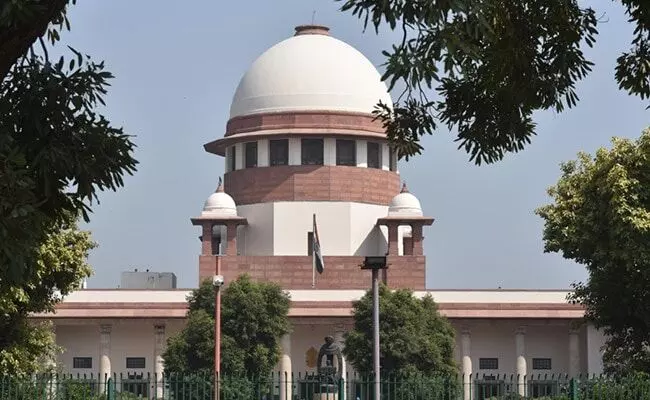Every citizen has right to criticise decision of state: SC
The top court also said every citizen has the right to extend good wishes to the citizens of the other countries
By Newsmeter Network
New Delhi: Every citizen has the right to criticise any decision of the state, the Supreme Court on Thursday said while quashing an FIR against a professor for his WhatsApp status criticising the abrogation of Article 370.
Setting aside an order of the Bombay High Court, the top court quashed the case against Professor Javed Ahmed Hajam against whom a case was registered under Section 153A (promotion of communal disharmony) of the Indian Penal Code.
The Maharashtra Police had registered the FIR at Hatkanangale police station in Kolhapur against Hajam for posting WhatsApp messages regarding the abrogation of Article 370 which said, "August 5-Black Day Jammu & Kashmir" and "14th August-“Happy Independence Day Pakistan".
The top court also said every citizen has the right to extend good wishes to the citizens of the other countries on their respective independence days.
If a citizen of India extends good wishes to the citizens of Pakistan on 14th August, which is their Independence Day, there is nothing wrong with it, the apex court observed.
"The Constitution of India, under Article 19(1)(a), guarantees freedom of speech and expression. Under the said guarantee, every citizen has the right to offer criticism of the action of abrogation of Article 370 or, for that matter, every decision of the State. He has the right to say he is unhappy with any decision of the State," a bench of Justices Abhay S Oka and Ujjal Bhuyan said.
The top court said every citizen of India has a right to be critical of the action of abrogation of Article 370 and the change of status of Jammu and Kashmir.
"Describing the day the abrogation happened as a 'Black Day' is an expression of protest and anguish. If every criticism or protest of the actions of the State is to be held as an offence under Section 153-A, democracy, which is an essential feature of the Constitution of India, will not survive," the bench said.
The apex court said right to dissent in a legitimate and lawful manner is an integral part of the rights guaranteed under Article 19(1)(a).
"Every individual must respect the right of others to dissent. An opportunity to peacefully protest against the decisions of the Government is an essential part of democracy.
"The right to dissent in a lawful manner must be treated as a part of the right to lead a dignified and meaningful life guaranteed by Article 21," it said.
The protest or dissent must be within four corners of the modes permissible in a democratic set-up, the bench said, adding it is subject to reasonable restrictions imposed in accordance with clause (2) of Article 19.
The apex court said in the present case, the appellant has not at all crossed the line.
The SC bench said the high court has held that the possibility of stirring up the emotions of a group of people cannot be ruled out.
"The appellant's college teachers, students, and parents were allegedly members of the WhatsApp group. As held by Justice Vivian Bose, the effect of the words used by the appellant on his WhatsApp status will have to be judged from the standards of reasonable women and men.
"We cannot apply the standards of people with weak and vacillating minds," it said adding that "our country has been a democratic republic for more than 75 years".
Observing that the people of the country know the importance of democratic value, the top court said it is not possible to conclude that the words will promote disharmony or feelings of enmity, hatred or ill-will between different religious groups.
"The test to be applied is not the effect of the words on some individuals with weak minds or who see a danger in every hostile point of view. The test is of the general impact of the utterances on reasonable people who are significant in numbers. Merely because a few individuals may develop hatred or ill will, it will not be sufficient to attract clause (a) of sub-section (1) of Section 153-A of the IPC," the bench said.
As regards the picture containing "Chand" and below that the words "14th August'“Happy Independence Day Pakistan", the bench said it was of the view that it will not attract clause (a) of sub-section (1) of Section 153-A of the IPC.
"Every citizen has the right to extend good wishes to the citizens of the other countries on their respective independence days. If a citizen of India extends good wishes to the citizens of Pakistan on 14th August, which is their Independence Day, there is nothing wrong with it.
"It's a gesture of goodwill. In such a case, it cannot be said that such acts will tend to create disharmony or feelings of enmity, hatred or ill-will between different religious groups. Motives cannot be attributed to the appellant only because he belongs to a particular religion," the bench said.
The top court said the time has come to enlighten and educate our police machinery on the concept of freedom of speech and expression guaranteed by Article 19(1)(a) of the Constitution and the extent of reasonable restraint on their free speech and expression.
They must be sensitised about the democratic values enshrined in the Constitution, it said.
The court said continuation of the prosecution of the appellant for the offence punishable under Section 153-A of the IPC will be a gross abuse of the process of law.
"Accordingly, we set aside the impugned judgment dated April 10, 2023 of the High Court of Judicature at Bombay and quash the impugned FIR," the bench said.